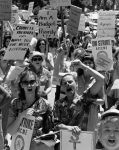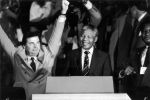Blogs
Pay Equity and the Public Employee
The Equal Pay Act of 1963 required that women be paid the same amount as men when performing the same work. This milestone, however, did not go far enough in protecting women from wage discrimination. This 1963 law promoted equal pay for equal work, but beginning in the 1970s, advocates for women’s rights waged a series of legislative and collective bargaining battles to provide equal pay for comparable work as well. read more »
2013: The Digital Year in Review
At the start of 2014, the Walter P. Reuther Library of Labor and Urban Affairs would like to take a moment to remember the year that's just ended and revisit the content that was added to our website in 2013. It was a banner year for the Reuther's blog, with more visits, visitors, and pageviews than in any previous year. read more »
Subject Focus: The 1913-1914 Copper Country Strike and the Italian Hall Disaster
December 24th, 2013 marks the 100th anniversary of one of the great tragedies of the early twentieth-century: the Italian Hall disaster of the 1913-1914 Copper Country Strike. read more »
The Ronald Raven Annual Award: Arranging and Describing a University's Progress
In the autumn of 2013, Wayne State University School of Library and Information Science student Lura Smith was chosen as the second recipient of the Ronald Raven Annual Award. This scholarship includes a stipend and a semester-long internship with the Wayne State University Archives; it is awarded to a student with an interest in university archives and records management. Upon completion of the intership, Lura recorded this impression of her experience.
I am interested in the archives profession because to me it represents the preservation of humanity. read more »



